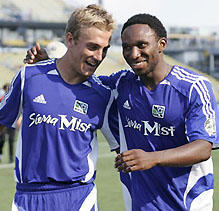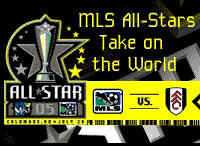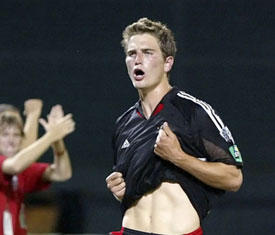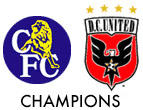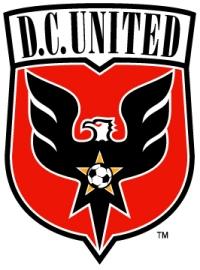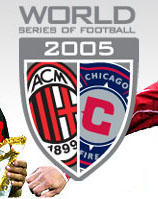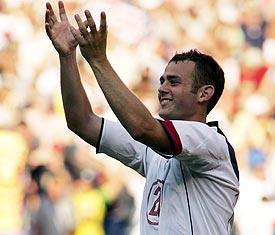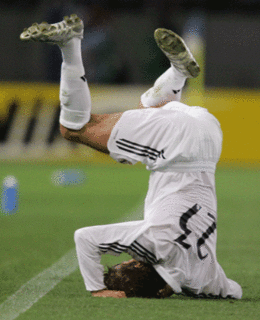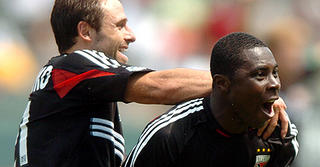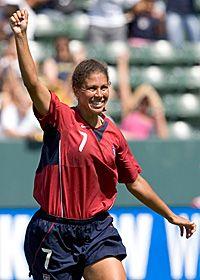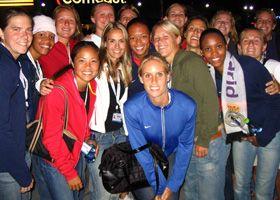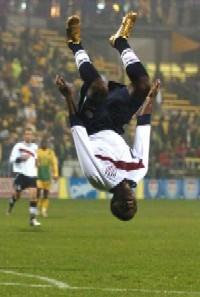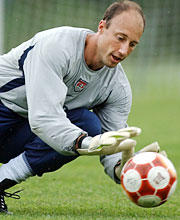Rumor has it the DC United is set to announce (perhaps right before their Thursday night match against Chelsea) the building of a soccer specific stadium within the DC limits. Talk of a soccer-focused stadium in the district has been going strong since last year when city leaders pushed for a baseball stadium for the Nationals. Their hope is to have the stadium running by the 2007 season.
This is good news for the MLS. It will mean that by 2007, six teams will be playing in soccer specific stadiums (Chivas, Dallas, Los Angeles, San Jose, Columbus and DC). In 2000, MLS commissioner Don Garber focused the league on building stadiums. His reasons for doing this were two fold.
First, perception. Watching a soccer match played on a football field is distracting. There are so many lines go everywhere that it is confusing to even a devote fan of the game. Also, the size of football stadiums leaves soccer crowds looking puny (it's almost like US football is more popular then US soccer). When you have a 20,000 strong crowd in a 60,000-seat stadium, well it looks 2/3rds empty. This makes it look like no one cares.
Second, financial. When a team is playing at a football stadium like RFK in DC, they have to pay to rent the stadium and in return get about half the money from ticket sales. However, they probably don't get half of food and drink sales that happen in the stadium during a match. In addition, they, more then likely, get none of the biggest moneymaker of them all, parking. This means that their revenue per game is very limited.
With soccer specific stadiums, they can build them to size, so to speak. Why have 40,000 empty seats? If you have a 20,000-seat stadium it increases your chance of a sellout (which is always fun to announce), it looks better on TV and in pictures and, perhaps most importantly, it makes the players feel they are actually playing in front of an audience. Also, it makes the league look much more permanent.
That said, the view against building stadiums mainly deals with the use of money. It costs $50-75 million to build said stadium (I might be off a bit on this, I have built very few stadiums in my life). The argument goes, wouldn't it be better to invest that money in players and advertising instead of racing to finance a stadium? Short-term, I can understand that approach, however, if you are hoping to grow the league, this is a failed solution. You might be able to get some bigger names to come in for a year or two, but once that money is used up, all those players are gone. With a stadium, teams have a steady flow of revenue, which over time will lead to the better pay for players.
Just as a side note, the issue of stadium fees was the major reason MLS pulled their offer of an expansion club in San Antonio, Texas. The issue even came up in the June runoff for mayor. MLS wanted to use the Alamodome (you know, the stadium that sits empty about 360 days a year), but they wanted really good terms. From what I understand, they wanted San Antonio to spend $2.8 million on 14 more luxury suites at the dome, and another $3.7 million on a practice facility. In addition to this, MLS wanted a 5 year rent free lease (with four more 5 year extensions), MLS would keep all revenue from tickets, parking and concessions, MLS would receive half of any revenues from events it co-sponsored (such as international friendlys), the city would receive 5% from any advertising signage sold by the team in the dome, and the city would receive 30 percent of the naming rights payments if a sponsor was lined up by 2006. If the sponsor were signed up after 2006, the city's cut would drop to 20 percent.
Needless to say, the city backed away. As you can see, MLS was basically asked for the whole house to be turned over to them. I can see why San Antonio blinked. Still, it is a shame this did not work, as the Alamo city would have made a great home for a club. By the way, the MLS is currently talking to folks in Houston about using the Astrodome (see dictionary under another big building sitting empty 99% of the time), so maybe a second Texas team is coming after all.
Labels: DC United
